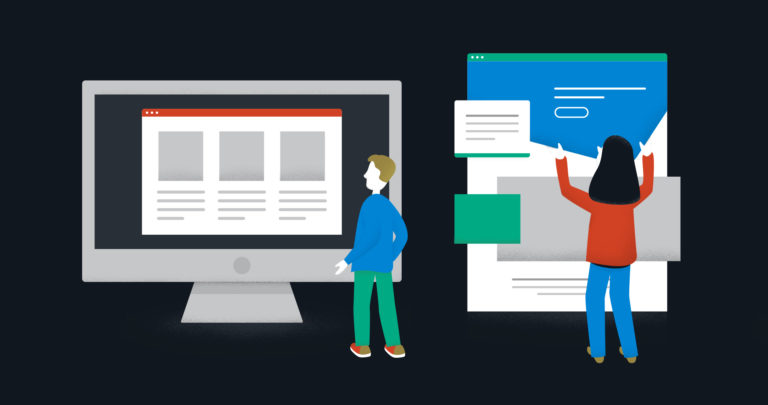Template or custom website?

Not all websites are made to be equal. Some are built using pre-existing themes and templates, and others are custom built from the ground up. Knowing what you’re getting before kicking off your project is crucial. All too often, we see companies unknowingly compare apples to oranges when they are initially selecting a web development and design agency. It’s easy to get hung up on the cost and forget about the difference in quality between your cheapest quote and your most expensive one.
Ask for input on quality
There are a lot of agencies out there and each has its own standard of quality. Ask the agencies you are interviewing for their perspective on templates versus custom websites. What is the difference in quality between the two? What do these agencies see as being the pros and cons to both options?
Ask them to explain their quote
Did they quote you on a template website or a custom one? Make sure you know. We’ve seen companies commit to a quote, only to realize later that the agency purchased and set up a template. If they had known, they would have selected a different agency from the start.
Custom versus template
Time and budget constraints are the most common reasons for choosing a template. There are some cases where a template could be considered, but it’s likely these templates were built with an objective different than yours.
Reasons to avoid templates
Time consuming: It depends on the nature of the change, but often changes to a template can take more time than changes to a custom website. Your new big idea (e.g. new feature, layout change, etc.) may not work within the limitations and restrictions of the template.
Things get messy: Many templates rely heavily on a page builder (e.g. Visual Composer). At first this may seem like an asset, but it can cause problems. For example, page builders save your content in a format that can only be read and displayed by the page builder tool. This makes manipulating or exporting your content more difficult than it should be. Also, to get around some of the inherent restrictions of a template, agencies write code on top of code.
They’re slow: A website that’s slow to load frustrates visitors. According to Neil Patel, today’s users expect a website to load within 2 seconds. Over the years, we’ve talked with many companies that have page speed issues. Although these issues are not exclusive to template websites, many templates we’ve reviewed perform at about 25% to 65% on Google PageSpeed Insights. If built right, custom websites can easily perform at 75% to 95%. Many companies do not know that page speed is just one of many factors Google uses to rank your website.
Creativity is stifled: You end up designing your website and its content around the template instead of around your specific objectives. The result? Your website often ends up being disjointed and ineffective.
Security can be an issue: Templates rely on many plugins. If not properly selected, plugins can have hidden vulnerabilities that go undiscovered for a long time. At times, templates are also incompatible with a plugin update, and therefore will be stuck on an old (and potentially insecure) version of the plugin.
Custom sites offer a better experience
A custom web experience typically costs more money, but not always. Unfortunately, some agencies get away with charging an exorbitant amount of money just to set up a template.
A custom site also gives you more freedom to scale your website as you grow. It usually lends itself to a stronger content strategy, too.
Instead of finding a template and trying to squeeze your content into its layout and aesthetic, a custom website ensures your content defines the layout and aesthetic. Our experience has shown us the latter leads to a better web experience for your users and results in better conversion rates. When you try to put your content into a pre-existing template, it feels a bit like trying to fit a square peg into a round hole.



